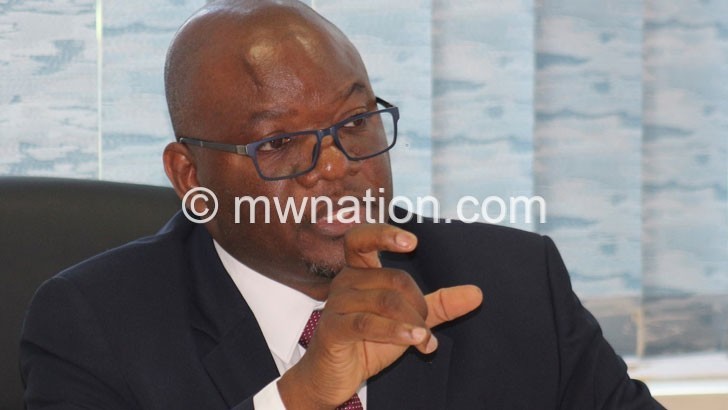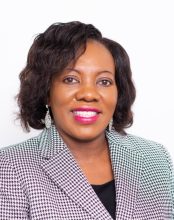it’s tsunami of abuse—ACB
ACB director general has described the plunder of public resources under the watch of the ousted Democratic Progressive Party regime, jointly being investigated by State agents, as a ‘tsunami’ which supersedes that of Cashgate.
The remarks follow continued reports of more abuse coming on the heels of the K5 billion cement scandal, which saw President Peter Mutharika’s personal bodyguard Norman Chisale arrested last week.
The Anti-Corruption Bureau ACB) chief Reyneck Matemba, in an interview with Nation on Sunday on Thursday, lamented that there has never been a coordinated working relationship among State agents in dealing with allegations of “serious and organised fraud” involving billions of Malawi kwacha as is the case now.
He said based on the seriousness of the allegations and unfolding evidence, it was imperative for ACB, Director of Public Prosecutions (DPP), Malawi Police Service (MPS) and Financial Intelligence Agency (FIA) to join hands to successfully deal with what he termed a “tsunami of a fraud”.
“I’m not exaggerating, but what we have before us is a ‘tsunami’. It’s beyond Cashgate, based on information and evidence before us. Malawians will see for themselves when trials begin in court,” Matemba said, without referring to a particular case.
Tsunamis are usually giant waves mostly caused by earthquakes or volcanic eruptions under the sea and may travel as fast as jet planes over deep waters and have caused untold destructions.
The ACB boss said the investigating and prosecuting agencies need more coordination as they move on, explaining that, for example, in the K5 billion cement scam involving personal bodyguard to the former president Peter Mutharika, Norman Chisale, the bureau received a complaint but they discovered police’s Fiscal and Fraud Section in Blantyre were already on the matter and had made remarkable progress.
“Malawi Revenue Authority [MRA] was actually cooperating with Fiscal Police and this is a case that suited Fiscal Police. But should they discover along the way some elements of corruption, we would not hesitate to come in.
“So, there is that sharing of information and intelligence among us, including FIA, which is playing a crucial role as per its mandate to probe transactions that individuals or institutions make. The FIA has no powers to prosecute, so they would always pass on their findings to some of us,” Matemba said.

The ACB boss said this working relationship is not only unique to the current cases, explaining that they did the same when the Cashgate, the systematic siphoning of public funds at Capital Hill in Lilongwe by public servants, broke out in September 2013 during the two-year regime of Joyce Banda.
Matemba described the current working relationship as excellent, suggesting that the teams should work together in both investigation and prosecution.
The DPP, he said, has no mandate to investigate but to prosecute and in some scenarios, the office may give police consent to proceed with prosecutions in some cases while ACB would seek consent from the DPP to prosecute corruption cases.
Asked about the coordination in the current cases, the DPP, through Ministry of Justice and Constitutional Affairs spokesperson Pililani Masanjala, said in a written response that ACB only gets consent to prosecute and investigation is their domain.

“Only when a file has been sent to the DPP from police and it has been perused can we now make requests for further investigation or any similar suggestion, but it doesn’t mean we are involved in the investigations. Each institution works independently, using its legal mandate,” Masanjala said.
Newly-appointed minister of Justice and Constitutional Affairs Titus Mvalo said, in a separate interview, it was encouraging to see investigating and prosecuting agencies working together, “just as it is expected”.
Mvalo said for every successful investigation and prosecution that can yield a conviction, which is an ultimate goal for investigating and prosecuting agencies, it was imperative for them to coordinate and work together.

National police spokesperson James Kadadzera also confirmed in an interview that there is good coordination between his institution and other bodies.
Role of boards questioned
But the fraud and looting of resources in State institutions has put under radar the role of boards of directors and executive managements where plunder is alleged to have thrived.
Chairperson of Human Rights Defenders Coalition (HRDC), Gift Trapence, said in an interview that inactiveness of some boards and executive managements is the more reason Vice-President Saulos Chilima, through his Ministry of Economic Planning and Development and Public Sector Reforms, is championing the reforms.
“We need reforms to make sure the boards and executive managements are able to function. This should also extend to ministries. Most of the boards were there as figure-heads. We had a rotten system under the Democratic Progressive Party (DPP) regime,” he said.
The Tonse Alliance administration, headed by President Lazarus Chakwera, has repeatedly said what would be happening as they govern is not political witch-hunt as the ousted Democratic Progressive Party (DPP) officials are claiming, but a matter of letting the law take its course.
Governance expert Augustine Magolowondo told Nation on Sunday recently, when Chilima embarked on reforms, that public sector reforms are the most crucial reforms to be undertaken if socio-economic and political transformation is to be achieved in the country.
Magolowondo said for the public sector reforms to be achieved there is need for a change of mindset for those working in parastatals.
The 2020 Annual Economic Report indicates that, on average, statutory bodies generated less than half of the projected revenues as at mid-year.
Since the Tonse Alliance came into power, there have been shocking revelations from some statutory corporations on how public resources were abused, in some cases allegedly involving officials of the former governing DPP. n





